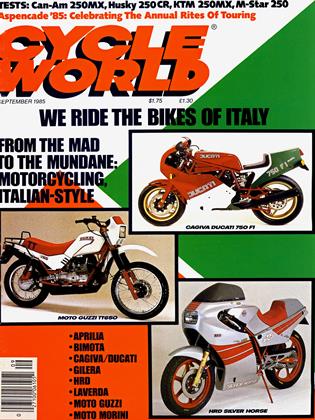LETTER FROM Europe
Alive and well in Great Britain
ALAN CATHCART
The man who invented the café racer, Britain’s Dave Degens, is hard at work inventing it all over again. Riding on the nostalgia wave, Degens' Dresda company is working flat-out to produce “new” versions of the classic Triton roadster, which he was the first to construct on a commercial basis back in the Swinging Sixties. At its most authentic, the Triton consisted of a 650c, pre-unit-construction Triumph Bonneville twin-cylinder engine in a wideline Norton “Featherbed” frame; the latter-day Dresda Triton features a late-model 750 Bonnie motor in a chrome-moly Dresda chassis based on the Manx Norton. The change was forced by a dearth of period components these days, now that people are preferring to restore their classic British motorcycles rather than junk them.
Talking of the classic boom in Britain, the success of historic roadracing there has proved an embarrassment for officials of the country’s Classic Racing Motorcycle Club, now the largest old-bike racing organization in the world. At the club’s season-opening meeting at Mallory Park, each of the 16 solo races had full grids of 36 bikes each, and more than 50 riders had to be turned down. A glance through the program revealed no less than 14 Manx Nortons being used in active competition, plus 17 Matchless G50/AJS 7R machines, 14 Aermacchi/H-D Sprints, and 29 Ducati singles. Other exotic bikes in use included rare Italian 500cc Linto and Paton specials, a John Player Norton, an XR750 HarleyDavidson roadracer (Renzo Pasolini’s old bike) and a half-dozen of Rob North-framed works-type BSA/Triumph Triples, all in the Classic F750 event. With four modern-bike race meetings already canceled outright in Britain this year for lack of entries, British roadracing is undergoing a difficult time thanks to high unemployment and tight money; and CRMC meets, which cater to postwar bikes built before 1973, are the only bright spot in an otherwise gloomy scene. >
While Cagiva's Massimo Tamburini works on the company's new monoshock chassis for the 973cc Ducati Mille engine, one of the most noted non-Italian constructors of VTwin desmo-engined bikes has begun to market a frame kit for the bevel-drive Mille motor. Britain’s Steve Wynne was the man behind Mike Hailwood’s TT comeback and Ducati’s first FI world championship, and his Sports Motor Cycles concern has been selling road versions of the 600TT2 racer for the past three years. Now Wynne is offering the Monomille, a singleseat, low-slung sportbike built around the big Ducati engine and available in road or race trim. Designed by Wynne but built by Harris Engineering, the single-shock, chrome-moly steel frame offers a seat height of 29 inches (down 4 inches from standard) and a twoinch-shorter wheelbase than the standard Ducati frame. The bike is also much lighter, at only 350 pounds dry complete with lights and road equipment; and thanks to the Pro-Link-type rear suspension with a White Power shock, rear wheel
travel is doubled. The Monomille can be supplied with either a 16inch or 18-inch front wheel, depending upon customer preference, though most of the purchasers of the 10 bikes built so far have opted for the smaller front wheel in the in-
terests of quicker steering. The basic frame package costs 2000 francs and will accept any bevel-drive Ducati engine; alternatively, complete bikes are available with the plain-bearing 973cc Mille engine at around 5000 francs, depending on specification.
Swiss movement for FJ11s
A llegedly, Yamaha’s FJ l 100 has encountered some stability problems at velocities of more than 120 mph (legally obtainable on German “autobahnen”), some of which are attributed to the bike’s 16-inch wheels. That has prompted Swiss chassis manufacturer Moko to come up with a new chassis for the FJ that features 18-inch PVM wheels. The ultra-low stance of the standard
FJl 100, combined with the tall stature of the average Swiss and German motorcyclist, also was a factor in Moko’s decision. Designer Hansi Hilti used to work with that other Helvetic tube-bender, Fritz Egli, and the result shows in the Moko frame, which has a large-diameter tubular backbone as on most Egli designs, with the compact Yamaha engine underslung from it. Dry weight is
420 pounds when fitted with Moko’s own 38mm front fork, Lockheed brakes, a deCarbon rear shock and a revised exhaust designed to boost midrange performance yet still conform to Switzerland’s 90-bhp maxiumum limit. An export version with other internal modifications is available, offering 122 bhp. Local price for the Moko-Yamaha frame kit is 8000 Swiss francs. E3
 View Full Issue
View Full Issue
More From This Issue
-
 Departments
DepartmentsEditorial
September 1985 By Paul Dean -
 Departments
DepartmentsAt Large
September 1985 By Steven L. Thompson -
 Letters
LettersLetters
September 1985 -
 Roundup
RoundupAikido: Pre-Accident Preparation
September 1985 By Camron E. Bussard -
 Roundup
RoundupLetter From Japan
September 1985 By Koichi Hirose -
 Special Feature
Special FeatureThe Motorcycles of Italy
September 1985 By David Edwards, Steve Anderson








